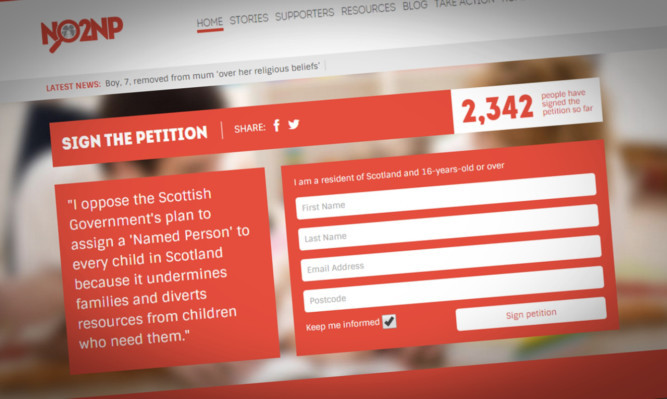Opponents of plans to appoint a “named person” for every child in Scotland have stepped up their campaign ahead of a fresh court battle against the policy.
The No To Named Persons (NO2NP) coalition has been gathering signatures in Dundee, Kirkintilloch, and East Dunbartonshire for a petition protesting against the measure, contained in the Children and Young People (Scotland) Act.
The group argues that assigning a single point of contact, such as a teacher or health visitor, to look out for the welfare of children under 18 breaches data protection laws and the human rights of parents.
Lord Pentland refused a petition for the judicial review of the legislation at the Court of Session, Scotland’s top civil court, in January but NO2NP appealed against the decision.
A panel of three judges will now consider the case again during a two-day hearing at the court from Wednesday.
The Scottish Government policy is already being rolled out in parts of Scotland including Angus, Fife, Highland, Edinburgh, and South Ayrshire.
Supporters say the service will act as a safety net to help families and children if they need it, to speed things up and avoid families having to speak to numerous different services.
A spokesman for NO2NP said: “We remain deeply concerned about the threats to the human rights of families to their privacy in their own homes as well as the breaches of data protection laws as the state passes confidential family information to and from different public bodies.
“It is anti-democratic, breaches the privacy of families and is an unwelcome intrusion into the lives of ordinary mums and dads trying to do their best to bring up their children.
“The state thinks the named person – a health visitor, a teacher or other professional – can fulfil the role better than mums and dads which is ridiculous.
“It’s vitally important that the higher courts consider this issue, because it’s driving a coach and horses through parents’ rights and private family life.”
The legal challenge is being led by the Christian Institute with the support of the Christian charity Care, the Tymes Trust and the Family Education Trust as well as individual academics and parents.
Children’s rights group Clan Childlaw has also applied to intervene in the appeal against Lord Pentland’s ruling.
Alison Reid, the group’s principal solicitor, said: “We all want to make sure that children and young people in Scotland are protected and recognise that when child protection issues arise, these need to be shared appropriately amongst professionals.
“However, where there are no child protection concerns, a child, like anyone else, should be entitled to a level of confidentiality when accessing advice.
“This Act creates a serious risk that children and young people will not access confidential services when they are in need of help.”
A Scottish Government spokesman said: “Earlier this year the Court of Session rejected this petition on all grounds and ruled that the legislation covering the Named Person service does not contravene ECHR rights or EU law.
“The ruling also found that the Named Person service was developed carefully over more than a decade with extensive input and wide support from experts and encourages professionals to work together. It also recognised that through prevention and early intervention, the service seeks to put the best interests of every child at the heart of decision making.
“A Named Person is a single point of contact for help, support or advice that children, parents and those working with children can go to if they need help with a particular issue.
“They will offer advice or assistance when it’s needed, there is no obligation on parents or children to approach the service.”
